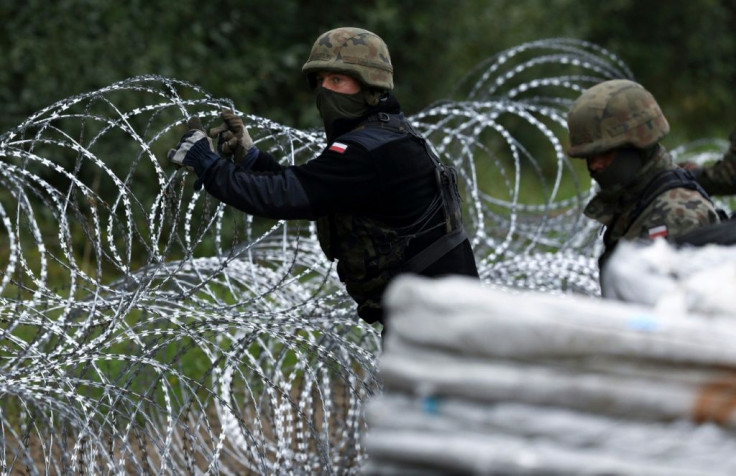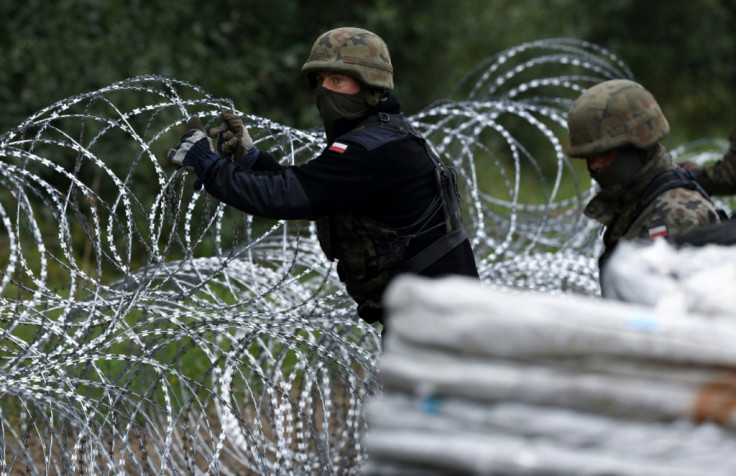Migrant Crisis Between Belarus and Poland Threatens Peace in Eastern Europe

The otherwise peaceful and scenic Eastern Europe is currently staring at a military standoff with Russia and NATO intervening in the simmering migrant crisis between Belarus and Poland.
Led by Polish Prime Minister Mateusz Morawiecki, the Baltic nations of Lithuania and Latvia Nov. 14 urged North Atlantic Treaty Organization (NATO) to take "concrete steps" to resolve the crisis. The three nations form the eastern flank of the EU and the NATO.
The United States, Britain, France, Estonia, Ireland, Norway, and Albania flayed Belarus at the UN Security Council meeting on Nov. 11. However, no action was taken given the strong ties between Belarus and Russia.
Rejecting the EU accusations that it has a role in the crisis unfolding on the dividing line between NATO to the west and Russia to the east., Russia, the main ally of Belarus, held joint drills with Belarusian paratroopers near the Polish and Lithuanian borders on Nov. 12. In the Belarusian airspace, Russian nuclear bombers also conducted a monitoring mission.

NATO, the intergovernmental military pact among 28 EU nations and two North American states, minced no words in a Nov. 12 statement when it warned Russia's trusted ally and called on Belarus to "to abide by international law." for peace to prevail in East Europe known for its picturesque towns and small villages.
Pointing to wars in Iraq and Afghanistan, Russian President Putin on Nov. 13 blamed the Western countries for causing the crisis on the Belarus-Poland border.
Belarus is reported to be hosting up to 20,000 migrants from the Middle East, Africa and Asia. According to reports, they were given easy access by the Belarusian government, headed by President Alexander Lukashenko for nearly 30 years, as a tit-for-tat against the EU-US sanctions. Their arrival began last summer on Belarus' border with Lithuania.
On the boards of Poland, where temperatures have fallen below freezing at night, there are 3,000-4,000 migrants, according to Polish authorities. So far, eight migrants have breathed their last, many from hypothermia.
Ukraine, which shares a border with Belarus on the south and moving closer to joining the 30 member NATO, has beefed up security on its frontier to prevent illegal entry of migrants.
Threatening Belarus with another round of severe sanctions, the EU has blocked one of the routes used by Middle Eastern migrants to reach Belarus. Thus, Turkey, a NATO member, stopped all citizens from war-torn nations of Iraq, Syria and Yemen from flying from Ankara to Minsk, Belarus capital, Nov 12. The EU is also putting pressure on Middle Eastern nations to follow suit.
President Lukashenko fears that the EU sanctions can trigger a domestic discontent and finally lead to a coup in the 9.4 million country to decide between allying with NATO or Moscow.
Armed with migrants mainly from the war-torn Middle Eastern nations, Belarus is bargaining to ease the economic sanctions imposed by the EU, which is yet to come to terms with the 1.3 million Syrian refugees it had taken in six year ago.
A strategically located Belarus has threatened to cut off gas supplies to Europe if fresh sanctions are imposed. Russian gas pipelines to the EU pass through Belarus from which it gets significant transit fees. Russia provides a third of Europe's gas.
Blaming the EU for causing the migrant crisis on its territory with the sanctions, Belarus is insisting on the EU to make concessions by asking Poland to let current batch of migrants enter the EU.
With the EU adding more nations to its folder, the humanitarian migrant crisis at the borders of Poland, Lithuania and Latvia, all members of NATO, has become a sordid political tragedy in the making.





